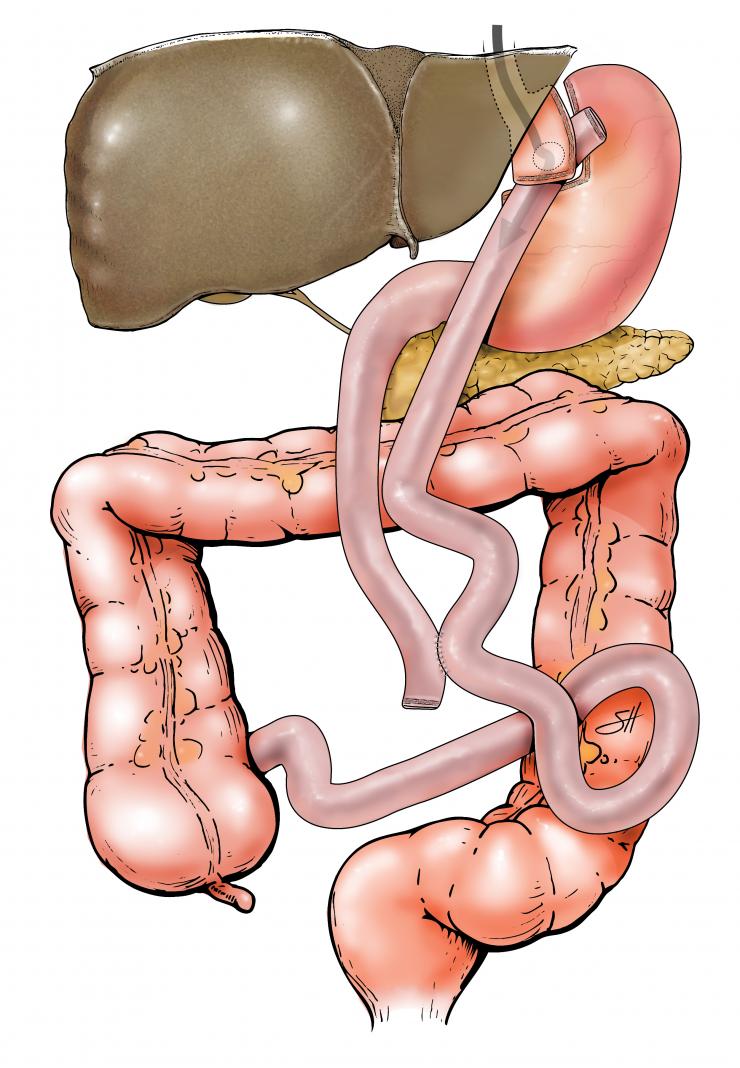Roux-en-Y Gastric Bypass Surgery
In normal digestion, food passes through the entire stomach and then enters the small intestine, where most of the nutrients and calories are absorbed. It then passes into the large intestine (colon), and the remaining waste is eventually excreted.
In Roux-en-Y gastric bypass, we make a small “pouch” out of the stomach and connect this pouch with small intestine so that food bypasses, or skips, the rest of the stomach and some of the small intestine. Your appetite will be much reduced and you will feel full more quickly than when your stomach was its original size. This reduces the amount of food you can eat at one time. This leads to weight loss without stress because you will not be as hungry as before the surgery.
This procedure is done by making several small incisions and using small instruments and a camera to guide the surgery (laparoscopic approach). The surgical robot (which is actually guided by the surgeon) can also be used for this operation.
This operation usually takes about 2-3 hours to complete, and the patient stays in the hospital for 1 or 2 nights.
Why is Roux-en-Y gastric bypass done?
Weight-loss surgery is suitable for people who are overweight and who have not been able to lose weight with diet, exercise, or medicine.
Surgery is generally considered when your body mass index (BMI) is 40 or higher. Surgery may also be an option when your BMI is 35 or higher and you have a life-threatening or disabling problem that is related to your weight.
It is important to think of this surgery as a tool to help you lose weight. It is not an instant fix. You will still need to eat a healthy diet and get regular exercise. This will help you reach your weight goal and avoid regaining the weight you lose.
What are the risks of Roux-en-Y gastric bypass?
Risks common to all surgeries for weight loss include a wound infection in the incision, a leak from the stomach into the abdominal cavity or where the intestine is connected (resulting in an infection called peritonitis), or a blood clot in the legs (deep vein thrombosis, or DVT) or lung (pulmonary embolism). Some people develop gallstones or a nutritional deficiency condition such as anemia or osteoporosis. Your surgeon and the team members will discuss these and other risks in more detail at the office.
Other risks from Roux-en-Y gastric bypass include:
- Stomach pouch problems. You may need a repeat surgery to repair the stomach and/or the opening between the stomach and the intestine.
- Vomiting. If you eat more than your stomach can hold, you may vomit.
- Hernia. These can be related to the incisions that the surgeon makes or caused by the intestine twisting around itself.
- Kidney stones. Drinking enough water can help prevent these from happening.
- Gallstones. Can happen in any patient who loses a large amount of weight.
What can you expect after Roux-en-Y gastric bypass?
There will be some pain for the first few days, which is usually well controlled with pain medicine. Because the surgery makes your stomach smaller, you will get full more quickly when you drink and eat.
Your doctor and the staff will give you specific instructions about what to drink and eat after the surgery. For about the first month after surgery, your stomach can only handle small amounts of soft foods and liquids while you are healing. It is important to try to sip water throughout the day to avoid becoming dehydrated. You may notice that your bowel movements are not regular right after your surgery. This is common.
Bit by bit, you will be able to add solid foods back into your diet. You must be careful to chew food well and to stop eating when you feel full. This can take some getting used to, because you will feel full after eating much less food than you are used to eating. If you do not chew your food well or do not stop eating soon enough, you may feel discomfort or nausea and may sometimes vomit. If you drink high-calorie liquids such as soda or fruit juice, you may not lose weight.
In a gastric bypass, the part of the intestine where many minerals and vitamins are most easily absorbed is bypassed. Because of this, you may have a deficiency in iron, calcium, magnesium, or vitamins. This can lead to long-term problems, such as osteoporosis. To prevent vitamin and mineral deficiencies, you may need to work with a dietitian to plan meals and take the necessary supplements.
There are certain foods that may empty into the small intestine too quickly and lead to dumping syndrome. This can cause diarrhea and make you feel faint, shaky, and nauseated. It also can make it hard for your body to get enough nutrition.
Almost all our operations are performed laparoscopically, meaning that there will be less pain and very few limitations on your activity. Most patients return to work 2-3 weeks after surgery.
© 2016-2021 Healthwise, Incorporated.








 Credit
Credit
